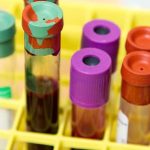What to Know About Crohn’s Disease Infusions
Crohn’s disease is one of two types of inflammatory bowel disease (IBD). Unlike ulcerative colitis, another form of IBD that affects the large intestine, Crohn’s disease can cause inflammation and irritation throughout one’s entire digestive tract. While it is a chronic condition with no known cure, there are several treatment options, including Crohn’s disease infusion therapy, that can improve symptoms.
Whether you were recently diagnosed or have had Crohn’s disease for years, navigating a treatment plan for the condition may feel overwhelming at times. At some point, your doctor may suggest infusions for Crohn’s disease to help manage your specific case.
What is Crohn’s disease?
To best understand how infusion drugs for Crohn’s disease work, it’s important to know exactly how the chronic condition affects your body. As a type of IBD, Crohn’s disease is an autoimmune disorder, meaning disease activity and symptoms occur when the body’s immune system attacks healthy cells by mistake. Crohn’s disease most commonly affects the small intestine, but that does not stop symptoms from appearing in other areas of the body.
When healthy cells are attacked, the intestines and other parts of the digestive tract become inflamed, causing symptoms like abdominal pain, diarrhea, constipation, weight loss and anemia. Some patients with Crohn’s disease can also experience symptoms like joint pain, dry eyes and skin conditions. At its most severe, Crohn’s disease can lead to permanent damage to the intestines and other complications that require surgery.
According to the National Institute of Diabetes and Digestive and Kidney Diseases, those who live in developed countries are more likely to be diagnosed with Crohn’s, and over half a million people in the U.S. have the disease. While it can appear at any age, it is most commonly diagnosed in patients in their 20s. Furthermore, there seems to be a genetic link among family members having IBD.
True or False? Crohn’s Disease is a form of irritable bowel syndrome (IBS).
Answer: False. Crohn’s disease is not the same as IBS. While IBS and both forms of IBD share similar GI-related symptoms and have no known causes, IBS is not a disease, does not cause active inflammation, and typically poses less risk for complications.
How is Crohn’s disease treated?
When dealing with Crohn’s disease or other gastrointestinal problems, it is important to find a doctor you trust. Because there is no cure for Crohn’s disease, medications are designed to improve a patient’s quality of life by managing symptoms.
Active symptoms mean a patient is experiencing a flare-up, and the goal of Crohn’s disease treatment is to achieve remission. A period of remission means you experience minimal symptoms with no active inflammation present in the GI tract.
To help reach and maintain remission, your doctor may prescribe one medication or combine different types of treatment, including:
- Antibiotics
- Steroids
- Immunosuppressants or immunomodulatory
- Biologics, or infusion therapy
Outside of prescribing medication, your doctor may also recommend avoiding certain foods, temporarily switching to a liquid diet, lifestyle changes like quitting smoking, or undergoing surgery.
While mild cases of Crohn’s disease can be maintained with lifestyle changes and oral medications like immunomodulatory. Moderate to severe cases typically require biologic therapy through injections or infusions via an IV.
What are the types of Crohn’s disease infusion medications?
Biologics for Crohn’s and other autoimmune diseases work by targeting specific proteins that lead to inflammation.
Three types of biologics that treat Crohn’s disease are administered via infusion:
- Anti-tumor necrosis factor (anti-TNF) agents, which are designed to block one protein called TNF-alpha
- Integrin receptor antagonists, which are made to stop compounds from entering tissue from blood vessels
- Anti-interleukin-12 and interleukin-23, which block multiple proteins that cause inflammation
Which type of Crohn’s infusion is right for you?
Crohn’s disease infusions have a high success rate of minimizing symptoms and inflammation. Because higher doses of medication can be delivered with an infusion, dates between infusions can be spread out. This type of schedule can be beneficial to patients.
Crohn’s infusion drugs are typically administered at an infusion center or hospital, giving you peace of mind that healthcare professionals are on site to monitor for reactions and answer questions.
Even if you and your doctor have decided infusions might be right for you, it can be hard to know what specific medication will work best. Thankfully, there are multiple Crohn’s medications that can be delivered via infusion. The most popular infusion choices each have a different schedule and treatment class.
Remicade (infliximab) – Infusions of this anti-TNF agent take two hours about every eight weeks after three initial loading doses are given over the course of six weeks.
Entyvio (vedolizumab) – Patients can choose to do infusions or a combination of infusions and subcutaneous injections with this integrin blocker. Infusions take 30 minutes. After three loading doses are given over six weeks, maintenance infusions occur every eight weeks. If you opt to do the Entyvio infusions/injections combo, you will have two infusion doses and then self-administer injections every two weeks.
Stelara (ustekinumab) – An anti-interleukin-12 and interleukin-23 medication, Stelara is a one-time infusion that takes one hour. After the first infusion, patients administer an injection every eight weeks.
Find an infusion center for treatment of Crohn’s
Your doctor will prescribe an infusion medication based on the severity of your Crohn’s disease, your medical history, insurance coverage and infusion center availability.
Personalized Hematology-Oncology is a certified infusion center serving Raleigh, Wake Forest, Durham and the surrounding Triangle area. Our experienced medical providers work with your doctor to develop your personalized treatment plan and provide a comfortable experience.
If you have been diagnosed with Crohn’s disease and are considering infusions, contact us today to find out if infusion therapy is right for you.





